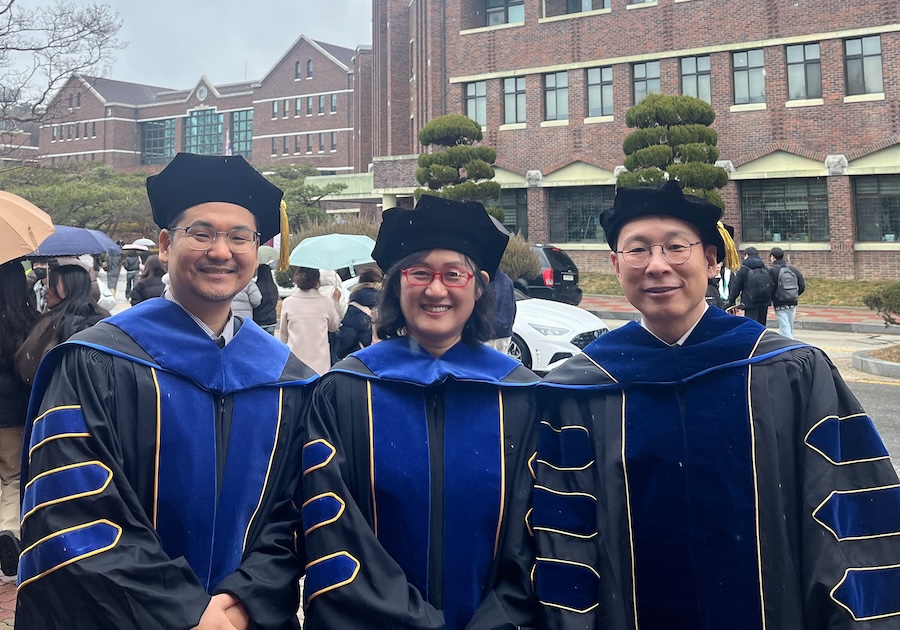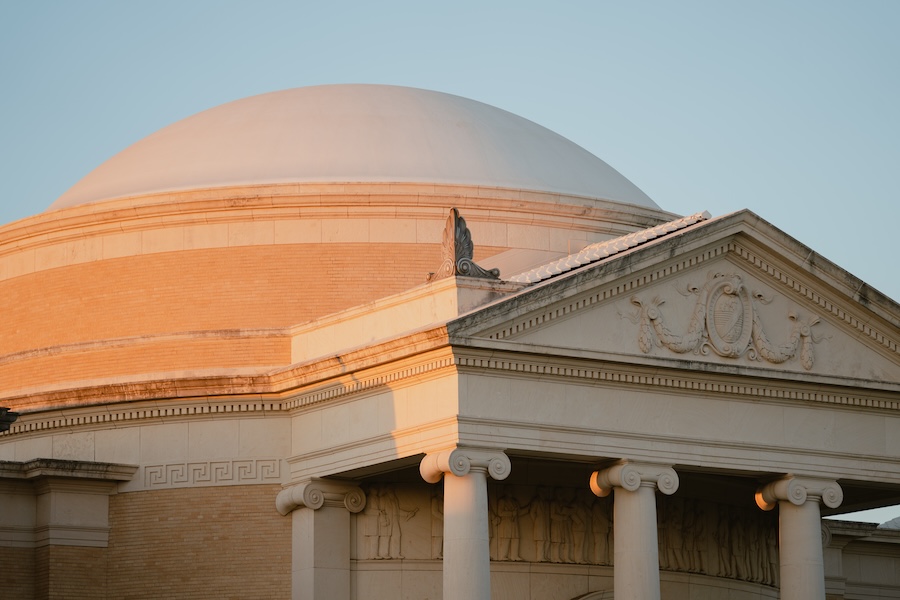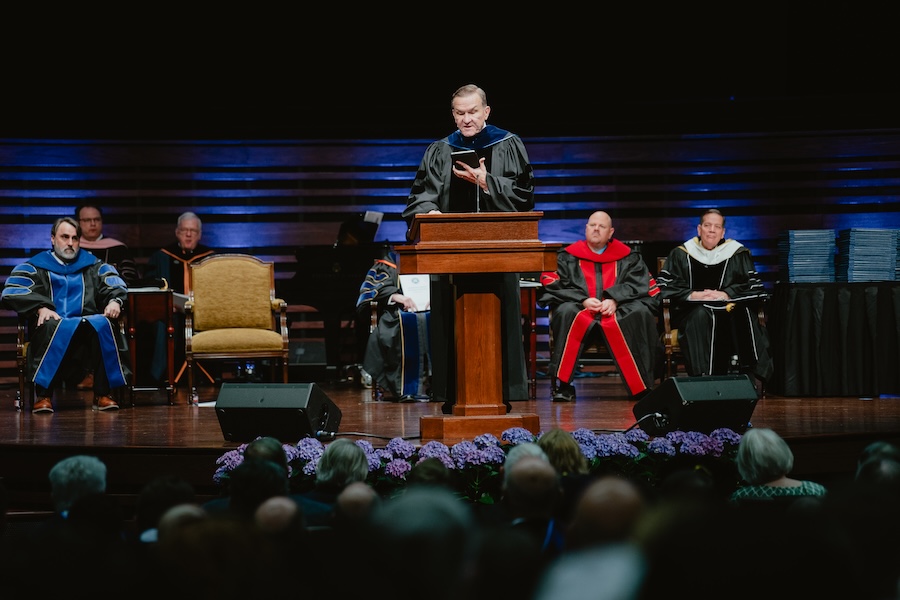When God Calls: Todd Pylant’s obedience to God’s call shown in faithful ministry highlighting discipleship and prayer
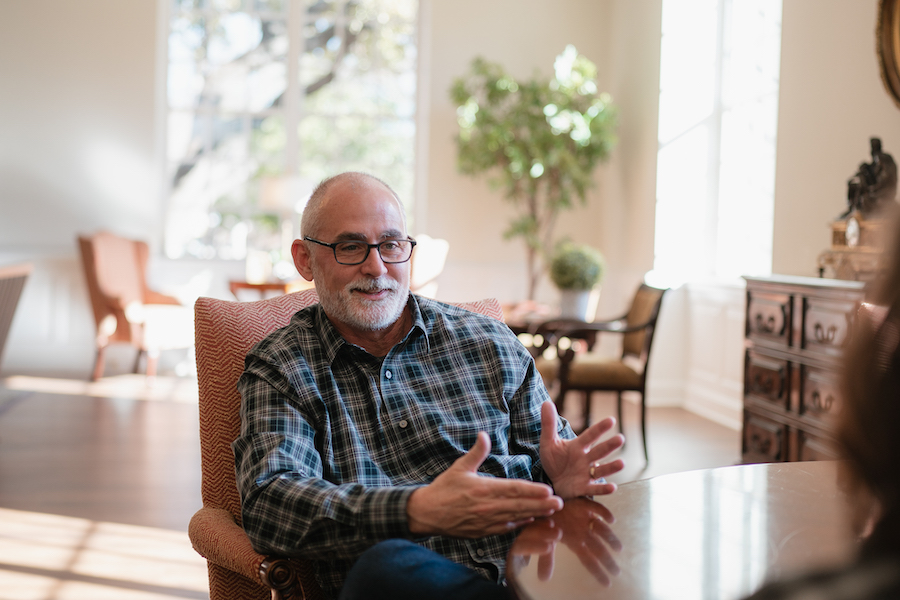
Editor’s note: This article originally appeared in the Spring 2024 issue of Southwestern News.
On the outskirts of Shawnee, Oklahoma, along a tree-lined but sparse road in Pottawatomie County, sits Hilltop Baptist Church. In the church’s stone building, as a visitor in a congregation of seven people, is where Todd Pylant (‘93), pastor of First Baptist Church of Benbrook, Texas, heard the Lord calling him to ministry.
Pylant was in the middle of his freshman year at Baylor University in Waco, Texas, but he was “pretty miserable,” he recalls. Thinking he had selected the wrong college following graduation from L.D. Bell High School in Hurst, Texas, where he had grown up since he was five years old, Pylant set out to find a different institution for his undergraduate education. While visiting a friend at Oklahoma Baptist University in Shawnee, Oklahoma, Pylant went to her church that Sunday morning.
It was the fall of 1985 and the pastor, a young Joseph Chambers who was only in the second year of his first pastorate, preached a sermon titled, “When God Calls,” Pylant remembers.
As the sermon was preached, Pylant says it was “just one of those experiences, you know, where you feel like the light is shining on you, and everyone’s staring at you” as he began to realize “part of what my misery was and unhappiness was: I had been wrestling with that calling and pushing it away and when I said ‘yes’” to God’s call “that misery and everything just lifted.”
More than three decades later, Pylant explains his experience that Sunday morning in rural Oklahoma “encouraged” him as it reminds Pylant that when he preaches today and does not see a response, he has “no way of knowing what God does” in the lives of those who listen to his sermon.
Pylant returned to his undergraduate studies at Baylor as a religion major and, as a junior, began serving as the student minister to the six students at First Baptist Church of Elm Mott, just outside of Waco. He says it was a “formative” experience as it was his first opportunity to teach Bible studies to youth on Sunday and Wednesday nights “week in and week out.” However, when Pylant was a senior in college, the church’s pastor injured his back and “was literally bedridden for a month.” The deacons asked Pylant to fill the pulpit in the pastor’s absence.
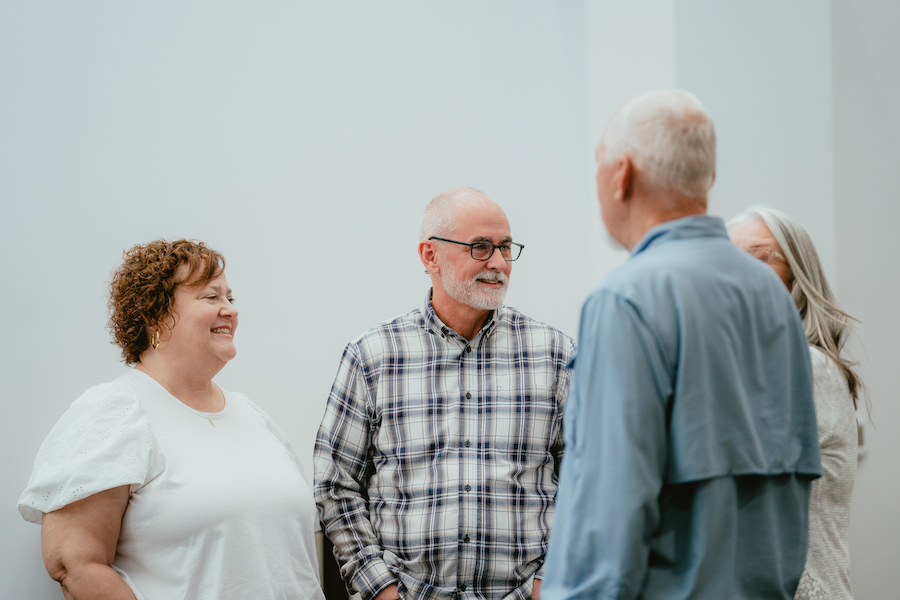
Todd Pylant, pastor of First Baptist Church of Benbrook, Texas, and 1993 Master of Divinity graduate of Southwestern Seminary, was called to ministry during his freshman year of undergraduate studies at Baylor University. Pylant married his wife, Kelli (left), following his graduation from Southwestern.
“That was the first time I had ever preached four sermons in a row,” he remembers, adding the experience was “one of the best things to ever happen to me” as he sensed a gift in preaching that was affirmed by the congregation.
Though he was born in Abilene, Pylant grew up in the Dallas-Fort Worth Metroplex in a “loving, stable home” with parents who were “the real deal with their faith.” While attending a summer church camp as a teenager at Falls Creek Conference Center in Davis, Oklahoma, with his fellow youth from North Richland Hills Baptist Church in North Richland Hills, Texas, Pylant realized he was not a Christian.
The camp preacher, Barry Wood, delivered a sermon that included an analogy about a restaurant under new management and the change that takes place when a new manager is leading.
“I think that was the first time I really realized that ‘I don’t know that I have been changed,’” Pylant recalls. “I was just in this lane as a good kid, but, have I ever really come under new management, so to speak?”
He says it was a “very real experience” as it was “where I think I started becoming a new person in Christ.” Pylant was discipled by the student minister at North Richland Hills Baptist Church who “invested” in the young believer “personally.”
When Pylant began as a Master of Divinity in biblical languages student at Southwestern Seminary in January 1990, it was with the encouragement of one of his professors at Baylor who told him at the Fort Worth-based institution they would “teach you how to think.”
More than 30 years after graduating from Southwestern, Pylant believes his time of study on Seminary Hill taught him “a very high view of Scripture” in hermeneutics and Old and New Testament classes, and to treat the Scriptures as “the inspired Word of God” with a “core conviction.” He notes that “later on in life” he had “some interaction with either liberal churches or liberal academic places” where the high view of Scripture was “absent.”
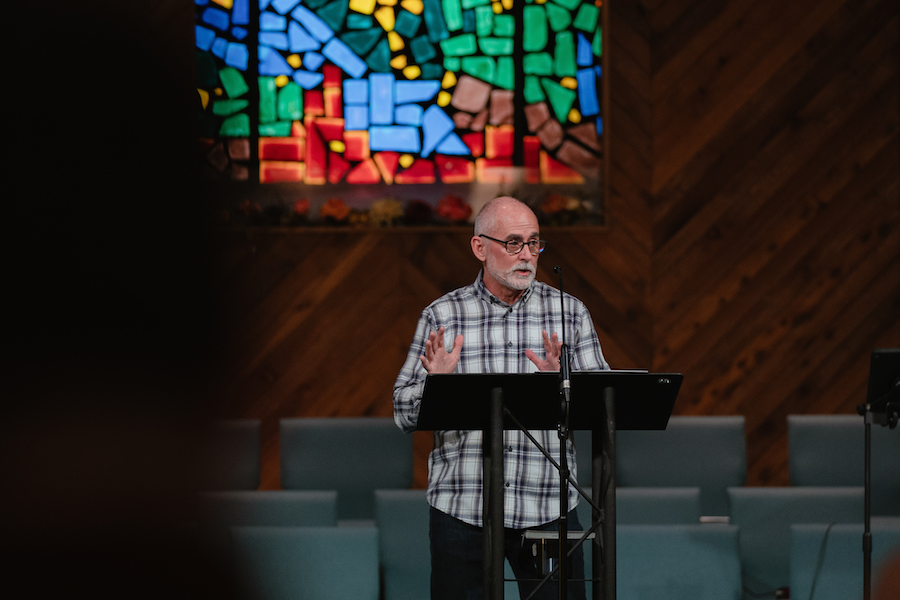
Since earning his Master of Divinity from Southwestern, Pylant has served churches in the Texas communities of San Angelo and Elm Mott, as well as the First Baptist Church of Augusta, Georgia. Pylant began serving as the senior pastor of First Baptist Benbrook in October 2004.
Following his 1993 graduation from Southwestern, he married his wife, Kelli. Two weeks later the newlywed couple moved 10 miles outside of San Angelo, Texas, where Pylant began to pastor the newly formed congregation of less than 30 people who were part of the new mission church of First Baptist Church of San Angelo called Dove Creek Baptist Church.
He remembers the experience was “a challenge” as he and his wife were hours away from their families in their first year of marriage, but he also had his first opportunities to work with lay leadership and preach weekly. The ministry also included his first funeral – for a local high school senior who died suddenly walking out of her high school English class.
Though Pylant served the West Texas church for only two years, he says the opportunity allowed him to “start learning and doing and practicing some of the basics of being a pastor.” Pylant and his family moved to Waco, where he enrolled in the Doctor of Philosophy program at Baylor. Simultaneously, the First Baptist Church of Elm Mott, where he served as youth minister when he was an undergraduate student, called him to serve as their interim pastor. However, after a year, he left the doctoral program as the church called him to be their full-time pastor and he and his wife welcomed their first child.
Pylant served the congregation at First Baptist Elm Mott for four years – a “really good four years,” he recalls – but at the end of this time serving he was “wrestling” with the question, “What do I want to be when I grow up?” His roommate from his seminary days was serving at the First Baptist Church of Augusta, Georgia, and explained there was a staff opening for a minister to young families. Pylant began serving in the northeast Georgia church at the beginning of 2001.
The three and a half years he spent serving in Augusta taught him the necessity of having a “Gospel-centered, biblically based pulpit,” Pylant says. When he began serving as the senior pastor of First Baptist Church of Benbrook in October 2004, he came with the desire to be “biblically based, Gospel-centered, and Spirit-filled” in his preaching. Pylant adds the three-fold basis for preaching is “essential” for the “rest of the church to be able to operate.”
“It has to have that Gospel engine driving the train,” he explains.
When Pylant was interviewing with the Benbrook church, David Crutchley (’80, ’85), former dean of the School of Theology at Southwestern, was leading the church as the interim pastor. Pylant recalls that Crutchley had assisted the church in future casting as he helped the church define “who we want to be.” Resonating with the vision, Pylant, who spent time praying and discerning the Lord’s will, remembers thinking he could “lead in that lane.”
Twenty years later, Pylant says the move for his family has been “fantastic” on “all levels.”
Linda Johnson, a church member at First Baptist Benbrook for 40 years, and her husband, Wayne, served on the search committee that called Pylant in 2004. Johnson explains at the time congregation was “becoming an aging church” and the potential new pastor’s “passion” for “family and children” was a draw.
In the 20 years Pylant has been her pastor, Johnson says he has been “amazing” as he has served the “church family” as both a preacher and pastor.
Johnson adds that Pylant is “very supportive” as he gives “authority” to the church staff and deacons and “participates with our youth.”
“He doesn’t have to be in charge of everything,” Johnson observes.
However, it is Pylant’s dual passions for prayer and disciple-making that have had a lasting impact on the church body. Pylant’s passion for making disciples was sparked when he first arrived at the Benbrook church and a 40-year-old man came to faith in Christ.
“I felt called, ‘You need to disciple this guy,’” he remembers. “And it dawned on me: I had no idea how to do that.” He began to look for a discipleship curriculum to work through with the man one-on-one. Pylant says that he was a “success story” and “he’s still faithfully following.” But, when that was not the case for a young adult man who came to faith in Christ, Pylant began a “journey.”
“If I’m the only one who’s involved in discipleship, then obviously our church is not going to make very many disciples,” Pylant recalls thinking. “And the method that I’ve been using, I’ve got one loss, one win. The win percentage is not real good.”
His observations led him to wonder what other churches were doing to make disciples. Around the same time, he was given a sabbatical from his church, which he used to “research” and visit other churches to find answers to his questions, including how churches used curriculum, and defined discipleship group leader qualifications and training requirements, he says.
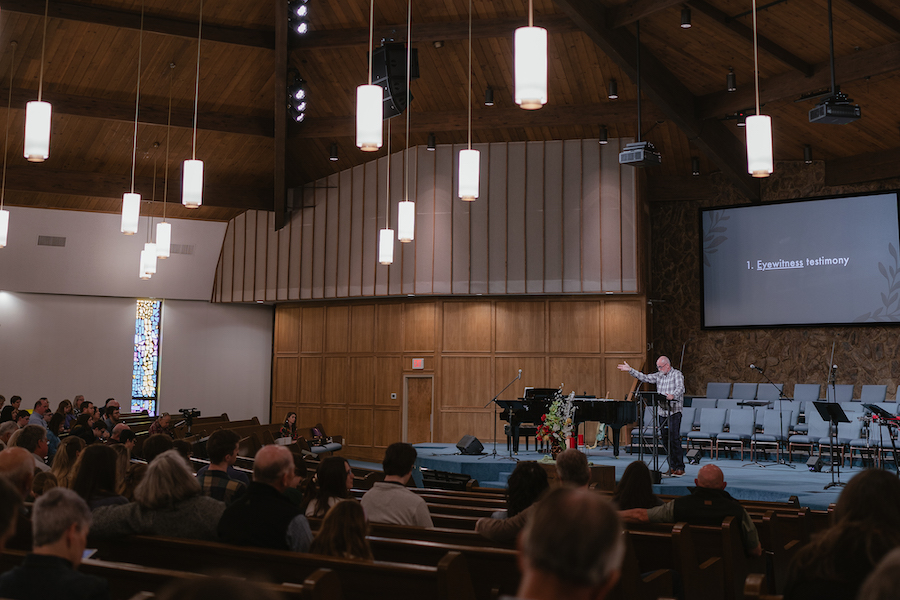
During the two decades that Pylant has served as the senior pastor of First Baptist Church of Benbrook, Texas, he has led the congregation to focus on disciple-making and prayer. Linda Johnson, a long-time church member who served on the search committee that called Pylant as pastor, says Pylant’s heart for discipleship stems from his “passion for prayer.”
Pylant’s discoveries led to finding a discipleship “method” that works for the First Baptist Church of Benbrook, but also the culmination of his research in the 2013 publication D14: A Strategy for Making Disciples Who Make Disciples at the First Baptist Church of Benbrook. One of a handful of books Pylant has authored, the book focuses on the disciple-making strategy the Benbrook church uses and gives an overview of discipleship methods and core issues related to each method.
At First Baptist Benbrook, the church began “small” using Scripture and peer-based discipleship groups, D-groups as the church terms them, Pylant explains. The groups are composed of three to five people of the same gender and have been on a “slow growth,” he says. However, Pylant adds, as the groups have grown over the years, the church is reaching “critical mass where it’s becoming part of the DNA of the church.”
Retired Air Force Col. George Steere (’93, ’03) has served as the chairman of deacons at the church since the fall of 2023. He says that discipleship is one of Pylant’s “priorities.”
Pylant is “constantly” asking “How are we doing? Are you memorizing the Scripture? Are you doing the different kinds of things you need to be doing?” Steere notes. As Pylant preaches “he’s always talking about discipleship,” Steere adds. “He’s always talking about people: people winning people, leading people to lead people.”
Johnson, though, says Pylant’s desire for discipleship stems from his “passion for prayer.”
Prayer meetings at First Baptist Benbrook had been on Wednesday evenings and Pylant recalls attendance was “tanking, tanking, tanking.” Realizing he had “grown this thing down to seven people,” Pylant remembers saying to his congregation, “I just want to learn how to pray together. I have no idea how to do that. Would y’all be willing to follow my lead and we’ll try to figure this thing out together?” The church agreed.
Pylant began reading and “trying stuff,” while also listening to the members of his church. When those who served in various ministries on Wednesday nights explained they could not attend the prayer meetings, the meetings were moved to Sunday evenings. Pylant says the move allowed more people to be involved.
Five years later, Pylant honestly attests that “leading corporate prayer meeting is still one of the hardest things that I do because I think prayer is one of the hardest things that we do.” He explains when there is a lack of relationship, care, or knowing whether there is an answer to prayer, then prayer is “easy.”
However, he says, when a person begins praying for people who are in close proximity, then “prayer gets really hard.”
“It’s hard to knock on the same door over and over and ask the same thing,” Pylant remarks. “It forces you to have faith questions.”
“We’re trying to learn as a congregation how to pray about things that matter,” including “how to pray with fervency” and “how to pray about kingdom stuff,” he adds. Pylant says as a congregation they are learning to “pray together in a way that is active praying” rather than listening to “each other pray.”
“The discipleship groups and the prayer groups, I think, has really had a pretty marked impact on … the discipleship nature of our church,” Pylant concludes.
Pylant’s influence extends to Seminary Hill, as well, as he is a member of Southwestern’s recently formed Board of Reference. Current Southwestern students are interns serving in the church’s multi-faceted ministries, and many seminary alumni serve on the church staff, including Gary Waller (’72, ’79), who formerly served as professor of administration at Southwestern, Timothy Tucker (’24), and Blake Theiss (’18). Additionally, Joseph Crider, dean of the seminary’s School of Church Music and Worship (SCMW), serves as the church’s traditional worship leader.
In addition to Crider and his wife, Amy, associate professor of foundations of education, a number of the seminary’s administration and faculty are members of First Baptist Church of Benbrook, including President David S. Dockery (’81) and his wife, Lanese; Charles T. Lewis Jr. (’93), associate dean of the SCMW; W. Michael Wilson (’74), senior professor of pastoral and applied ministry; Michael Wilkinson (’90, ’11), associate professor of theology and director of professional doctoral studies; and Marc Brown, assistant professor of church music and worship.
A number of retired International Mission Board missionaries call First Baptist Benbrook their church home, as well.
As Pylant enters his third decade of leading the First Baptist Church of Benbrook, he recognizes the “undeniable call” God has on his life, and knowing to do anything else would make him “feel like I would be abandoning or forsaking the good work that God has created me to do.”
Ashley Allen (’03, ’09) is managing editor of Southwestern News.
